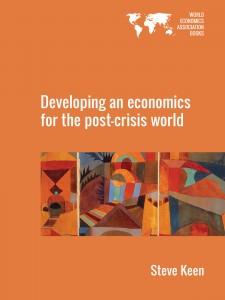Economists have no ears
Thomas Kuhn once famously described textbooks as the vehicle by which students learn how to do “normal science” in an academic discipline. Economic textbooks clearly fulfil this function, but the pity is that what passes for “normal” in economics barely deserves the appellation “science”.
Most introductory economics textbooks present a sanitised, uncritical rendition of conventional economic theory, and the courses in which these textbooks are used do little to counter this mendacious presentation. Students might learn, for example, that “externalities” reduce the efficiency of the market mechanism. However, they will not learn that the “proof” that markets are efficient is itself flawed.
Since this textbook rendition of economics is also profoundly boring, the majority of those exposed to introductory course in economics do no more than this, and instead go on to careers in accountancy, finance or management – in which, nonetheless, many continue to harbour the simplistic notions they were taught many years earlier.
The minority which continues on to further academic training is taught the complicated techniques of economic analysis, with little to no discussion of whether these techniques are actually intellectually valid. The enormous critical literature is simply left out of advanced courses, while glaring logical shortcomings are glossed over with specious assumptions. However, most students accept these assumptions because their training leaves them both insufficiently literate and insufficiently numerate.Most modern-day economics students are insufficiently literate because economic education eschews the study of the history of economic thought. Even a passing acquaintance with this literature exposes the reader to critical perspectives on conventional economic theory – but students today receive no such exposure.
They are insufficiently numerate because the material which establishes the intellectual weaknesses of economics is complex. Understanding this literature in its raw form requires an appreciation of some quite difficult areas of mathematics-concepts which require up to two years of undergraduate mathematical training to understand.
Curiously, though economists like to intimidate other social scientists with the mathematical rigour of their discipline, most economists do not have this level of mathematical education. Though economics students do attend numerous courses on mathematics, these are normally given by other economists. The argument for this approach – the partially sighted leading the partially sighted – is that generalist mathematics courses don’t teach the concepts needed to understand mathematical economics (or the economic version of statistics, known as econometrics). As any student of econometrics knows, this is quite often true. However, it has the side effect that economics has persevered with mathematical methods which professional mathematicians have long ago transcended. This dated version of mathematics shields students from new developments in mathematics that, incidentally, undermine much of neoclassical economic theory.
Developing an economics for the post-crisis world
Steve Keen

































If this is the reality for professional economists in training, just think of what the reality is for the citizen in the street – and the voting booth. One of my favorite lamentations is for the low level of presentation, much less understanding, of the history of political economy in the main stream press, even in an election year like 2016 in the U.S.
Who has heard of Neoliberalism and Austerity in this presidential campaign?
A double tragedy.
Economics is not the only social science to suffer some of these problems, to inflict disinformation and arrogance on the “citizens on the street,” or misuse and abuse mathematics. Sociologists and psychologists have been “forcing” life skills and personality fixes on people for years. And psychologists and sociologists have abused and misused mathematical probability/statistics so long they’ve forgotten they are doing it. The more academics get involved the worse it becomes. Historians have so beaten down the history of ordinary people, the poor, and society’s “misfits” as to make these people not only wrong but dangerously wrong. Just talk to most members of the American Historical Association about populists, racial/class movements, or most sorts of rebels. In graduate school, I once questioned a professor on his teaching of the American Revolution. Based on the content of his class it wasn’t a revolution at all. Merely a disagreement among gentlemen. Things are a bit better today. But not much. In the history of science for example historians still teach that the elite, gentlemen scholars invented science. No mention of blacksmiths, farmer botanists, armorer metallurgists, or the navigational knowledge of sailors. Anthropologists developed notions that literally changed the shape of the entire planet. First, the notion of development. Some societies (those in the west) are simply more highly developed than others (those in Africa or Asia). Someday the latter might catch up with the former. The second thing anthropologists did was invent the notion of race. And we know how much that invention has helped the world.
Graph theory please! Economies are graphs. They’re complicated networks that transfer value along some edges and money along other edges. Anything interesting that economies do is about the shape of these graphs, who’s included or excluded, symmetries and asymmetries, making and breaking edges, flows, and imbalances. Economies are graphs! Teach economics with graph theory, not with statistics!
Exactly. Graphs are representations, but realities represent themselves.